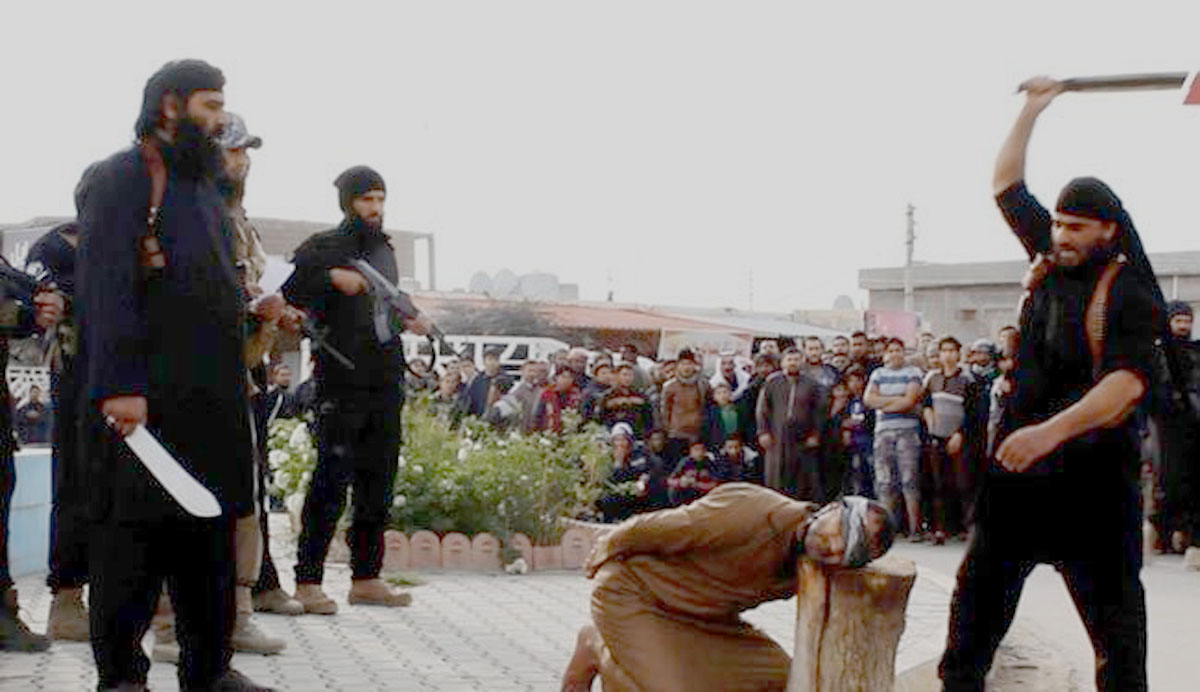
How can pacifists possibly defeat ISIL, the cruel Islamic State government that has taken violence to a horrifying new level in Iraq and Syria? This is the question we've been asked most urgently since we launched the fundraising drive for Pacifism21 three weeks ago.
We're glad people are asking this question, because we have a great answer. How can pacifists defeat ISIL? Answer: carefully and slowly.
This response is sometimes met with howls of derision, possibly delivered at the level of a shout. "CAREFULLY AND SLOWLY? THEY ARE BEHEADING PEOPLE. DON'T YOU SEE HOW AWFUL THEY ARE?"
Yes, we see how awful they are, and we see that they are wearing black — evil! — and brandishing antique knives — barbaric! — and using social media to spread their message of hate — clever! Still, a pacifist will not tend to see ISIL as very different in kind from other military organizations. The evil of a military organization is measured not by the color of its clothing, its choice of weaponry and its marketing strategy, but rather by its actions.
In this sense, ISIL is a familiar kind of monster, and must be countered with a familiar approach: containment, infiltration, strategic planning, direct opposition. This is how smart non-pacifists (like many of our current world leaders, including US President Barack Obama) are combatting ISIL right now. Practical pacifists are likely to accept the sad truth that this frustrating but effective method is the best one available, and are likely to endorse it for lack of a better idea.
In other words, pacifists live in the real world, and make real world choices.
It's weird that anyone would expect pacifists to have a miraculous solution to the problem of cruel organizations like ISIL. Pacifism is a powerful method, but not a magical one. How does a pacifist put on pants? One leg at a time, like anybody else.
Does this invalidate pacifism? Of course not. We see the difference when we look at the terrible decisions made by non-pacifists that empowered ISIL in the first place. ISIL was born in 2006 as the strongest surviving remnant of Saddam Hussein's power base in Iraq, which had of course been removed from power by the 2003 invasion of Iraq. The 2003 invasion of Iraq was the heavy-handed and badly misdirected response to Al Qaeda's 2001 attack on the United States.
Pacifists opposed the 2003 invasion of Iraq, of course, and here's where we see the significant difference this philosophy can offer. Pacifism isn't meant to be a form of military strategy, just as preventive medicine isn't meant to be a form of surgery. Pacifism isn't going to help win the current war, but it will help prevent the next war, and the ten or twenty or hundred or thousand wars that will follow the next war, just as the next war would follow directly from those that precede it.
How should the USA have responded to Al Qaeda's 2001 invasion of Iraq? Carefully and slowly. Instead, in the years after September 11 2001 the stunned citizens of the United States of America tragically discovered just how weak, insipid and clueless its elected leadership was, as George W. Bush, Dick Cheney and Donald Rumsfeld carried out a program of "bold, decisive action" that toppled Iraq's Sunni-led government of Iraq and empowered its Shiite majority to form a new government, leaving a power vacuum among the Sunni base. The results include the breakup of civil society all over Iraq, the deaths of hundreds of thousands of innocent people, and the formation of ISIL.
It was during these years that a pacifist sensibility was most needed — and when a more comprehensive and vocal pacifist presence (like the organization we are working to build could have helped the most.
Pacifist voices were heard in 2003, but not loudly enough. By endorsing a strategy of hasty and openly aggressive intervention in foreign power struggles in 2003, the USA's elected leaders did not act carefully and slowly. The result speaks for itself.
So: how do pacifists defeat ISIL today? Answer: Carefully and slowly. It won't destroy our enemies quickly or easily, because pacifism is not a form of magic. But this approach will do a better job of destroying our enemies than any known alternatives, and it will avoid empowering the next army waiting in the wings.
Sometimes pacifism can't offer a great answer, but only the best answer available. Paradoxically, these may be the times when this important philosophy can have the greatest impact on our future, and when it is needed the most.
